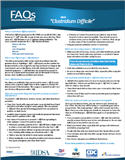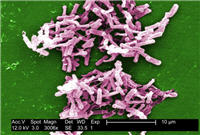Patients
Clostridium difficile Infection
Take antibiotics only as prescribed by your doctor. Antibiotics can be life-saving medicines. When a person takes antibiotics, good germs that protect against infection are destroyed for several months. During this time, patients can get sick from C. difficile picked up from contaminated surfaces or spread from a health care provider’s hands. Those most at risk are people, especially older adults, who take antibiotics and also get medical care.
Frequently Asked Questions 
- FAQs about Clostridium difficile poster for printing [PDF - 179 KB] 8.5" by 11" flyer
- FAQs about Clostridium difficile poster for printing - Black and White format [PDF - 153 KB] 8.5" by 11" flyer
- Download FAQs about Clostridium difficile Larger text poster for printing [PDF - 194 KB] 8.5" by 11" flyer
- En español: Preguntas frecuentes "Clostridium difficile" [PDF - 206 KB] 8.5" by 11" flyer
Patients Can:
- Take antibiotics only as prescribed by your doctor. Antibiotics can be lifesaving medicines.
- Tell your doctor if you have been on antibiotics and get diarrhea within a few months.
- Wash your hands after using the bathroom.
- Try to use a separate bathroom if you have diarrhea, or be sure the bathroom is cleaned well if someone with diarrhea has used it.
CDC Vital Signs
General Information about C. difficile
Clostridium difficile [klo–strid–ee–um dif–uh–seel] (C. difficil) is a bacterium that causes inflammation of the colon, known as colitis.
People who have other illnesses or conditions requiring prolonged use of antibiotics, and the elderly, are at greater risk of acquiring this disease. The bacteria are found in the feces. People can become infected if they touch items or surfaces that are contaminated with feces and then touch their mouth or mucous membranes. Healthcare workers can spread the bacteria to patients or contaminate surfaces through hand contact.

For more images of this bacterium, search the Public Health Image Library.
Symptoms of C. difficile
Symptoms include:
- Watery diarrhea (at least three bowel movements per day for two or more days)
- Fever
- Loss of appetite
- Nausea
- Abdominal pain/tenderness
Transmission of C. difficile
Clostridium difficile is shed in feces. Any surface, device, or material (e.g., toilets, bathing tubs, and electronic rectal thermometers) that becomes contaminated with feces may serve as a reservoir for the Clostridium difficile spores. Clostridium difficile spores are transferred to patients mainly via the hands of healthcare personnel who have touched a contaminated surface or item. Clostridium difficile can live for long periods on surfaces.
Treatment of C. difficile
In about one in four patients, Clostridium difficile infection will resolve within 2-3 days of discontinuing the antibiotic to which the patient was previously exposed. Clostridium difficile is generally treated for 10 days with antibiotics prescribed by your healthcare provider. The drugs are effective and appear to have few side-effects.
Get email updates
To receive email updates about this page, enter your email address:
Contact Us:
- Centers for Disease Control and Prevention
1600 Clifton Rd
Atlanta, GA 30333 - 800-CDC-INFO
(800-232-4636)
TTY: (888) 232-6348 - New Hours of Operation
8am-8pm ET/Monday-Friday
Closed Holidays - cdcinfo@cdc.gov


